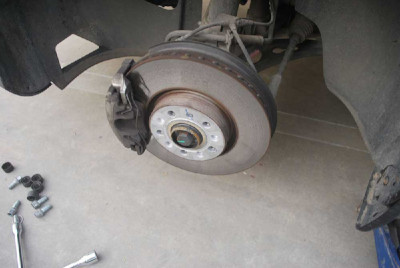Brakes are pretty much the most important safety device on your car. If you’ve ever partially lost your brakes in the past, you’ll agree that it’s not something you want to experience again. Inspecting your brakes twice a year for wear and damage can protect you and your passengers. Additionally, it will also help save you money by catching any damage before it becomes too costly.
Brake System Components That Can Fail
 The master cylinder, the heart of the vehicle’s braking system, holds the brake fluid when it is not being delivered to the brakes through the brake lines. If brake fluid leaks because the master cylinder is worn or brake lines are plugged or broken, the fluid cannot be delivered, and the brake pads will become ruined.
The master cylinder, the heart of the vehicle’s braking system, holds the brake fluid when it is not being delivered to the brakes through the brake lines. If brake fluid leaks because the master cylinder is worn or brake lines are plugged or broken, the fluid cannot be delivered, and the brake pads will become ruined.
The brake fluid itself can become dirty or contaminated as it draws rust-causing moisture and picks up other debris, or it can break down from excess heat. Clean brake fluid is either clear or slightly yellow, while dirty brake fluid may be brown or even black. Old and dirty brake fluid can damage ABS brake systems internally.
The brake lines connect to the master cylinder through a combination valve, which combines a metering and proportioning valve. It regulates the pressure on the front and rear wheels to make sure both sets of brakes are applied simultaneously. A malfunctioning combination valve may cause the wheels to lock up.
Brake pads and shoes can be made of ceramic, metal or organic materials, while the disc rotors and drums they press against are made of metal. Because the pads and shoes create friction to stop the car, they gradually wear down over time and may wear away completely, letting the metal of the calipers and cylinders they are attached to grind against the rotors and drums and damage them. Some pads have a metal strip attached that sounds a warning whistle when the pad becomes too worn, but this strip sounds only when the car is in motion and the brakes are not applied.
Howdy, Bloomington drivers. Let’s talk about your brakes. Basically, the power brake system helps you provide braking power so that you don’t have to do all the work with your brake pedal. The brakes themselves are applied at the wheel using hydraulic pressure. When we step on the brake pedal, we create pressure in the power booster that’s multiplied by vacuum from the engine. The resulting pressure pushes brake fluid through the master cylinder into tubes and hoses that run to the brake at each wheel.
When there’s a problem, it’s usually a fluid leak somewhere along the line. It could be at a fitting or a hose, or even an internal leak in the master cylinder. A leak gives the pressurized fluid somewhere to go other than to the brakes, so stopping power is hurt. Lose enough fluid and you can’t stop at all. Of course that’s extremely dangerous for us Bloomington drivers and the others on the road.
If you notice any decrease in stopping power or if your pedal seems mushy, you could have a problem. There are some preventive maintenance items for the power brake system that will help them last longer. At RJ’s Auto Repair in Bloomington, we provide comprehensive brake maintenance and repair service.
Obviously Bloomington drivers want to make sure their brake fluid is filled to the recommended level. Low fluid in the master cylinder could indicate a leak or worn brake material. Master cylinder leaks are usually due to it wearing out, but leaks in the brake lines and connectors can be minimized by replacing the brake fluid from time to time. Additives in the brake fluid protect against corrosion that can damage brake components.
Bloomington drivers should take note that brake fluid also attracts moisture which can lead to rust — not a good thing for expensive anti-lock brake components. Also, significant amounts of water in the brake fluid can affect stopping power because the water has a much lower boiling point than brake fluid. In the high temperature environment of the brake system, the water can vaporize — and steam doesn’t do a very good job of providing hydraulic pressure.
A final word — make sure you use the recommended type of brake fluid. There are several kinds, and using the wrong one can lead to total brake failure. Your friendly and knowledgeable RJ’s Auto Repair can help you.
A brake is a mechanical device for slowing or stopping a vehicle (usually by means of friction). In short, a brake inhibits your car’s motion. It lets you stop the car whenever and wherever you choose. Brakes are one of the most important parts of a motor vehicle. Without them, you would not be able to stop the car. If your vehicle’s brakes are having issues, consider having them worked on. Brake experts at Rj’s auto Repair can work on your car’s brakes to ensure you have a safe drive.





